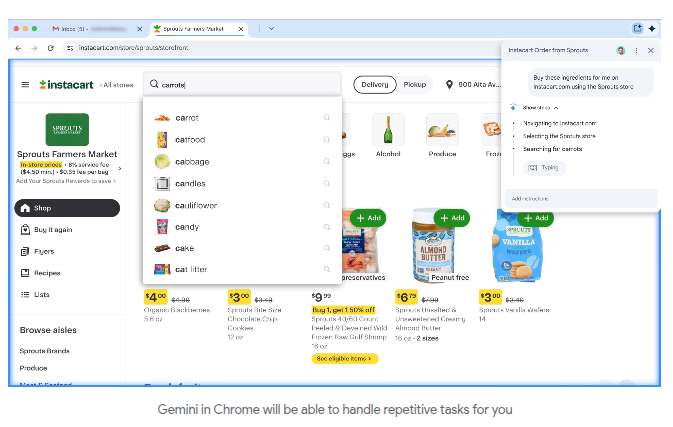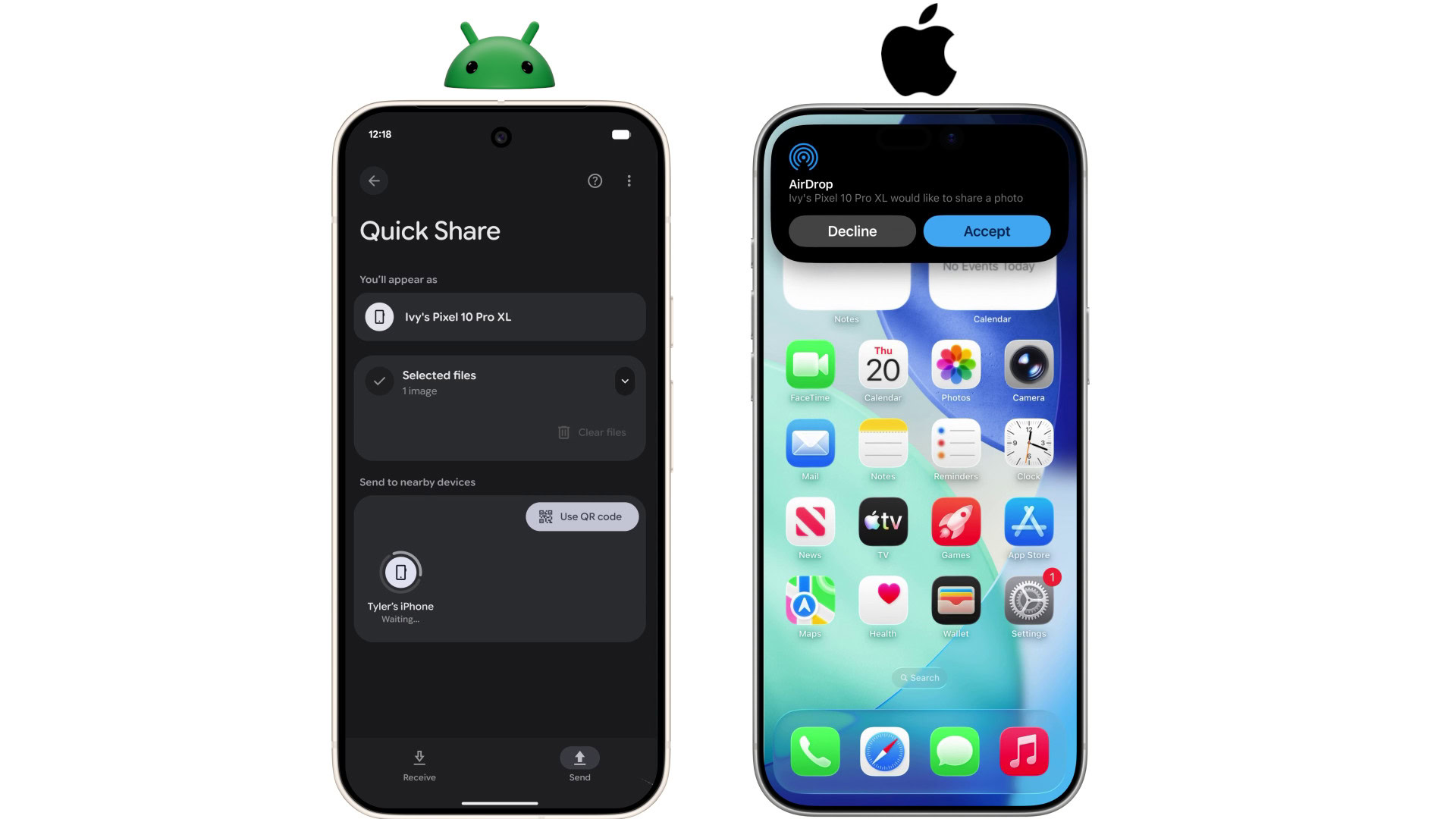Google LLC has long used its Chrome web browser as a way to boost the popularity of its products and services, notably to strengthen its dominance in search, and now it’s trying to do the same for artificial intelligence.
The company today revealed it’s enhancing Chrome with a host of new AI features powered by its AI assistant Gemini. It’s increasing the prominence of its AI mode, which is its more conversational search utility, and will also integrate AI agents into the browser, so users will be able to ask it to complete browsing tasks on their behalf.
In a blog post, Mike Torres, Chrome’s vice president of product, said users will soon be able to call up AI Mode from right within the browser’s address bar. It’s going to add a new tool called the “omnibox,” where people will be able to type out a search phrase or ask a question and receive a conversational response without leaving the page they’re currently viewing.
Google is also integrating the Gemini AI assistant within Chrome, so users will be able to ask it questions about the web page they are viewing. It will also be able to see all of their other open tabs and answer questions about them too, Torres said. This feature has been around for a few months already, but was only available to paid users, but it’s now being made free.
Gemini could help users to compare and summarize information from multiple open tabs. So if someone is searching for flights, a hotel and activities across several different websites, they can ask Gemini to consolidate what they’ve found in a single itinerary.
According to Torres, Gemini will be able to remember user’s browsing histories to better understand the context of their queries. It will also link Chrome to other Google services, such as YouTube and Google Calendar, he said.
Google launched the Chrome browser back in 2008 and it has since become the world’s most popular, commanding around 70% of the global web browser market share, according to Statcounter. The company has leveraged its browsing dominance to ensure that Google retains its dominance in search, and every time someone buys a new device, it immediately asks users if they want Google to be their “default” search engine. In addition, the browser also collects useful data from users that helps to improve its search algorithms.
The company has gotten into trouble for this practice, and in a recent antitrust lawsuit brought by the U.S. Justice Department, it’s being forced to end this practice and offer users a choice of default search engines, and also share some of its search data.
However, it’s clear that the Chrome strategy worked, and now Google seems to be doing the same thing with its AI services. By integrating Gemini with Chrome, it can help to increase its market share at the expense of other AI chatbots, such as OpenAI’s ChatGPT, and gather more data on how people are using AI.
Agentic browsing is coming soon
Gemini is being rolled out in Chrome now, but it will be a few months before one of the most impactful new AI features becomes available.
Torres said the company is planning to launch an “agentic browsing assistant,” which will be able to complete various browser-related tasks autonomously on behalf of users. The Chrome agent will be able to do things such as fill up an Amazon shopping basket, write replies to emails, copy and paste information from websites into a document so it’s easier to access, and so on.
The agentic experience will be able to run in the background, so it will be possible to instruct it to go shopping for products on Amazon, while users can continue doing something else in Chrome. However, should the agent need to clarify something, such as the users’ preferred brand of jeans, it will interrupt them to ask.

Torres said the agent will also ask for confirmation before completing irreversible actions, such as actually sending the emails it has written or checking out and paying for goods on Amazon. In such cases, it will ask users for explicit permission before it does these things. However, it’s not clear if this may change in future, given that just yesterday, Google revealed that it’s working on an agentic payments protocol called AP2, which will ultimately enable AI agents to make pre-authorized payments on behalf of users.
Google isn’t the first to launch a browser agent. In fact, it’s a bit late to this game, with OpenAI’s Operator and Anthropic PBC’s Claude for Chrome offering similar autonomous browsing functions. These features remain in their infancy, though, so it’s not certain how useful Google’s Chrome agent will actually be.
In the case of OpenAI’s Operator, it appears that it’s still prone to glitches and not always reliable. It’s also fairly slow, and it’s pricey too. The feature is locked behind a $200-per-month paywall, and even then, usage is restricted as it uses a mountain of “tokens” as it browses autonomously.
Holger Mueller of Constellation Research Inc. said Google’s AI capabilities are generally superior to its rivals, and its slow rollout of AI agents in Chrome demonstrates its leadership in this area. “Google knows it doesn’t need to be the first, and that it’s more important to get it right,” the analyst said. “By doing this later, Google will hopefully avoid many of the mistakes and false starts made by earlier AI pioneers. These updates are also important because they bring features to Chrome that were already available outside of its web browser, making them more visible.”
Another potential advantage for Google is the fact that its AI agent will be “native” to Chrome. Torres said the company has been following its rivals’ experiments and will make sure its offering is “more robust” by the time it launches. It’s notable that this is something the company has been working on for almost one year already, so it may well be able to do it better than its rivals. “Our hope, by the time this gets to users, is that we’ve done away with many of those potential snafus,” he said.
Google didn’t say if it intends to make Chrome’s agentic capabilities a paid feature, but it would be surprising if it’s made available for free.
Images: Google
Support our mission to keep content open and free by engaging with theCUBE community. Join theCUBE’s Alumni Trust Network, where technology leaders connect, share intelligence and create opportunities.
- 15M+ viewers of theCUBE videos, powering conversations across AI, cloud, cybersecurity and more
- 11.4k+ theCUBE alumni — Connect with more than 11,400 tech and business leaders shaping the future through a unique trusted-based network.
About News Media
Founded by tech visionaries John Furrier and Dave Vellante, News Media has built a dynamic ecosystem of industry-leading digital media brands that reach 15+ million elite tech professionals. Our new proprietary theCUBE AI Video Cloud is breaking ground in audience interaction, leveraging theCUBEai.com neural network to help technology companies make data-driven decisions and stay at the forefront of industry conversations.








